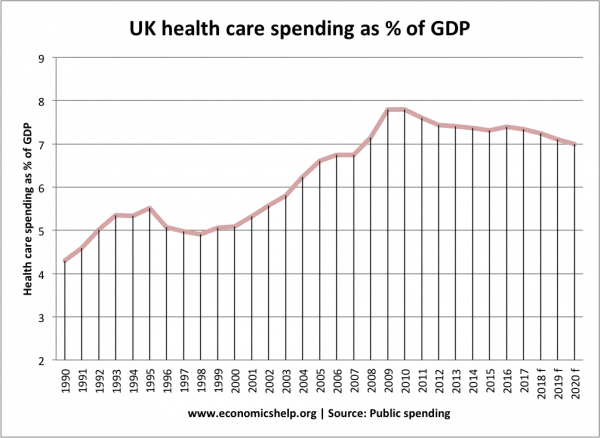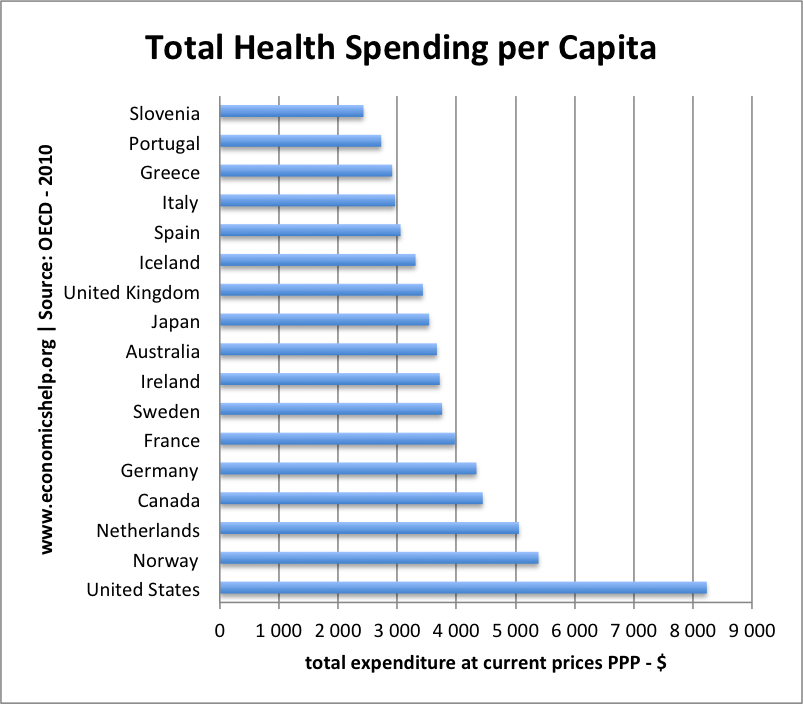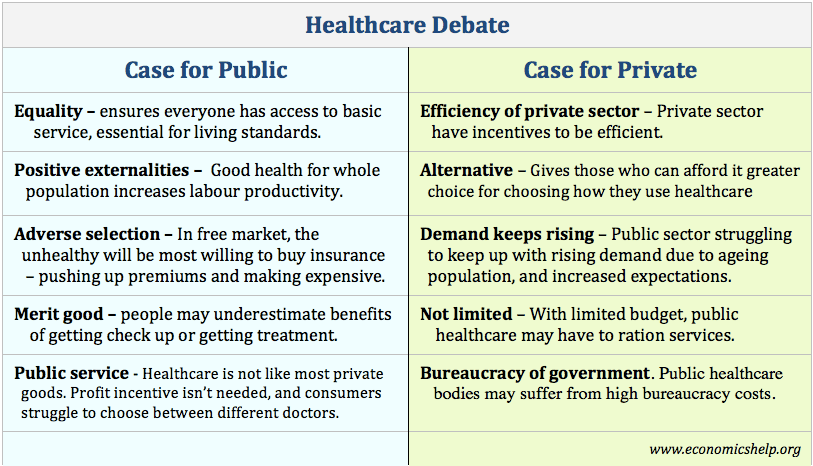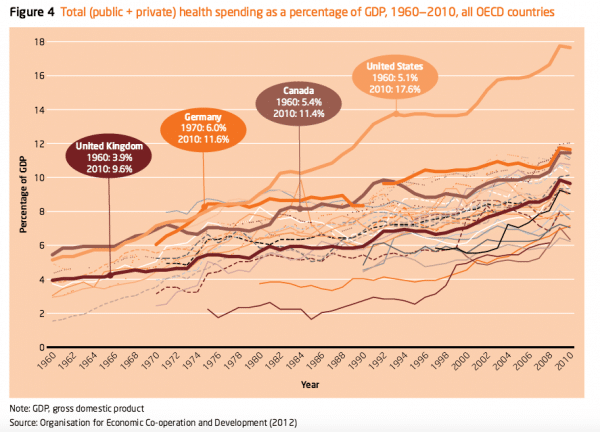A look at some arguments for and against public/private healthcare provision.
Should healthcare be left to the free market or should the government provide universal healthcare?
Arguments for Public Health Care
- Healthcare is not a profit maximising industry. Doctors and nurses don’t need financial incentives to do a good job but are motivated by aims of patient care and job satisfaction.
- Healthcare doesn’t work as a free market. Patients tend to trust diagnosis of the doctor. They don’t go shopping around for best or cheapest health care. Trying to introduce competition in healthcare is fruitless because in practice patients are not in a position to shop around choosing between different doctors. In healthcare, consumer sovereignty doesn’t apply to other markets.
- Public healthcare provision means everyone has access to this important public service. Left to the free market, there would be some who don’t have private healthcare insurance and would suffer.
- Health care is a merit good. People may underestimate the importance of going to doctor for a check-up. This could lead to some diseases being left unchecked and becoming more serious and difficult to treat.
- Private healthcare and government subsidies for poor and elderly mean very high administration costs.
- Private healthcare insurance firms make large profit meaning more expensive health care for countries like the US, who have private provision.
- The problem of adverse selection. The problem with the private provision is that people who are likely to be unhealthy will have greatest desire to purchase healthcare insurance. This raises insurance premiums. However, young healthy people will then be discouraged from buying relatively more expensive insurance; therefore many young people will not take out insurance – meaning insurers are left with a higher percentage of unhealthy people. This problem of adverse selection requires some kind of government intervention to reduce average premiums and make sure young healthy people do not neglect to take out health insurance.
- When health care is paid for by private insurance. There is actually less mechanism for evaluating the cost/benefit of different treatments. Doctors are happy to prescribe expensive treatments, which may do little to help because the bill is paid for by insurance companies. In the public sector, there is a discipline of sticking within budgets and rationing health care to where it is needed most.
Arguments for Private Health Care
- Gives people greater choice.
- Not limited by public budget which may limit access to expensive treatments
- Private healthcare firms may have efficiency incentives to provide better service than government bodies.
- With an ageing population and increased range of treatments, demand for health care is rising faster than economic growth. This means that governments are having to spend a higher % of government spending on healthcare – but are still struggling to keep up with expectations. A greater role for the private sector enables health care providers to keep up and reduce the burden on government spending – enabling lower tax rates.
- Reluctance to increase taxes to pay for healthcare. The NHS has the difficulty of rising demand, but limited willingness to increase taxes to pay for it. Increasing role of the private sector can fill the gap.
- Government services can become bureaucratic and experience diseconomies of scale. Arguably the NHS is over-staffed with too many administrators. Private health care can avoid these tendencies to bureaucratic inefficiency.
Examples US and the UK

UK Healthcare spending as % of GDP rose from 4.5% in 1990 to just under 8% in 2010.
This reflects a global trend to higher healthcare spending.
Source: Kings Fund Rising health care spending is a global phenomenon.
US healthcare costs
The US healthcare has a strong element of private provision – with private insurance complemented by government programmes like Medicaid and Medicare. There is no universal right to healthcare.

The US has the highest per capita expenditure on healthcare, but still, some people don’t have proper access.
Related



so what I wanted To Say about this article is that it iS Terrific and wonderfUl and i know this is Petty but it is super amazIng and thank you for listening to my teD talk
I think there are solid arguments on both sides. The problem is healthcare will never be free. Whether its run by government or the private sector it will always cost money. The problem is whether or not you would like to be able to pick and choose what services you would like and what quality of care you would like to receive. The biggest point in the article is that the private sector has incentives to provide the best quality care possible while if it was operated by the government, individual healthcare workers lose many competitive factors that drive their efficiency to the maximum. The only positive is that healthcare becomes available to all people rather than to only those who can afford it. I believe the obvious fix to this is to have the government provide it for those who cant afford it but never force those who can afford to pay for their own onto their system. This would retain the free market competitiveness to increase efficiency while still providing healthcare to every single citizen.
“The biggest point in the article is that the private sector has incentives to provide the best quality care possible while if it was operated by the government, individual healthcare workers lose many competitive factors that drive their efficiency to the maximum.”
This is not true, the private sector is not incentivized to provide the best quality care possible, but to make the most profit possible for shareholders. On the surface, it may seem that these should go hand in hand, but especially in a system as complex as healthcare, patients often do not know what to expect for standard of care. For example, a private hospital is more likely to offer interventions such as scans (leading to radiation exposure) or procedures (such as colonoscopy) even if the patient does not need it because it will increase their profit margin. Likewise, they are less likely to offer services that have lower profit margins or have less predictable costs. If the margins afforded by providing an improvement in service are not worth the cost, the private company is less likely to offer the improved service.
While this seems a good analysis in terms of inputs, seems somehow incomplete that you’re not showing outputs/outcomes. Despite the US having the highest expenditure, it has really bad health outcomes when compared with other more affordable countries. Therefore, the rationale for increasing efficiency/effectiveness is not fully demonstrated if the overall health of the country is not better off. And that is a crucial part of the puzzle here!